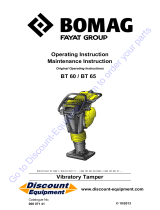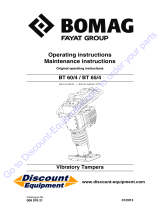
Contents
iii
[en] | 12/2020 | 5100056023 | WP | Operator’s manual
Contents
1 EC Declaration of Conformity
2 Preface
2.1 Introduction ....................................................................................................................................... 6
2.2 Storage location of the operator's manual ........................................................................................ 6
2.3 Accident prevention regulations........................................................................................................ 7
2.4 Wacker Neuson Contact................................................................................................................... 8
2.5 Limitation of liability........................................................................................................................... 8
2.6 Labeling on the machine................................................................................................................... 8
2.7 Use of the operator’s manual............................................................................................................ 9
3 Usage
3.1 Designated use............................................................................................................................... 10
3.2 Unintended use............................................................................................................................... 10
4 Safety
4.1 Safety symbols and signal words ................................................................................................... 11
4.2 Principle .......................................................................................................................................... 11
4.3 Structual changes ........................................................................................................................... 12
4.4 Responsibility of the operator ......................................................................................................... 12
4.5 Obligations of the operator ............................................................................................................. 13
4.6 Qualification of staff ........................................................................................................................ 13
4.7 General safety instructions ............................................................................................................. 13
4.8 Specific safety instructions for vibration plates ............................................................................... 15
4.9 Safety features................................................................................................................................ 16
4.10 Maintenance ................................................................................................................................... 17
5 Description of the Machine
5.1 Scope of delivery ............................................................................................................................ 19
5.2 Type plates and labels.................................................................................................................... 19
5.3 Components ................................................................................................................................... 21
5.4 Control elements............................................................................................................................. 21
6 Transportation
6.1 Safety instructions for transport ...................................................................................................... 23
6.2 Prerequisites and preparations....................................................................................................... 23
6.3 Lifting the machine.......................................................................................................................... 23
6.4 Lashing the machine....................................................................................................................... 24
7 Commissioning
7.1 Mounting the guide bracket ............................................................................................................ 25
7.2 Tests before commissioning ........................................................................................................... 25
7.3 Safety instructions for operation ..................................................................................................... 26
7.4 Putting into operation...................................................................................................................... 26






















